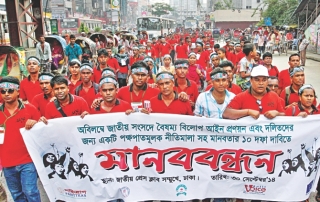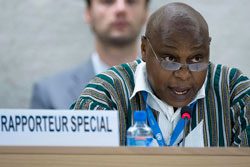UN Special Rapporteur calls for new measures to fight violence against women
The Special Rapporteur on violence against women, its causes and consequences, Ms. Rashida Manjoo called for the adoption of different norms and measures to fight violence against women around the world and a binding standard of accountability at the international level.
Caste at the root of India and Mauritania’s position as top global slavery offenders
The Global Slavery Index 2014, released by the Walk Free Foundation, singles out India as the country in the world with the most slaves and sees caste at the root of slavery in India. Caste-affected Mauritania tops the Index on percentage of the population in slavery.
Report: Dalit girls in modern slavery in India’s textile industry
A new report following up on modern slavery in Indian spinning mills, finds that despite initiatives launched to end conditions of forced labour, the situation remains alarming. Efforts of clothing brands and retailers to end this, lack scale and conviction. Due to their marginalised status and lack of alternative opportunities, the majority of girls working in these factories are Dalits.
India called out at UN General Assembly for blocking IDSN’s UN consultative status
At the UN General Assembly meeting on the 28th October, The UN Special Rapporteur on the exercise of the rights to freedom of peaceful assembly and of association, Maina Kiai, criticised India for arbitrarily blocking the International Dalit Solidarity Network (IDSN) from obtaining UN consultative status calling it “clearly unacceptable, wrong and unfair.”
UN agencies in India team up to fight caste discrimination
Convened by the United Nations Development Programme, six UN agencies in India including IFAD, ILO, UNFPA, UNICEF and UN Women are working together to help accelerate inclusion of Dalit and Adivasi issues and access to rights in national and state policy and planning processes.
Joining forces to rehabilitate manual scavengers – Government, UN Agencies, businesses and civil society
There was a strong will from multiple stakeholders to help rehabilitate former manual scavengers at the ‘National Consultation on Rehabilitation of Manual Scavenger’s and Role of the Government, UN agencies, Public and Private Sector, CSR and Civil Societies’ consultation held in New Delhi.
Indian Prime Minister Modi takes a sweep at caste
October was a month of headlines on India’s Prime Minister, Narendra Modi, asking the nation to rise above caste divides and telling every Indian to pick up a broom and sweep the streets. Modi’s drive to make India clean and to end the practice that one caste group is tasked with cleaning up after all the others, sounds promising. It remains to be seen, however, whether there will be true reform and political will to end caste discrimination, behind the hype.
Caste discrimination, child labour and the Nobel prize
Caste discrimination is a key factor behind child labour in India, home to the highest number of child labourers in the world. This is the message coming from experts on child labour. The Nobel Peace Prize winner, Kailash Satyarthi, also explains how witnessing caste discrimination as a child spurred on his engagement with fighting for the rights of the most marginalised.
Bangladesh: Dalits fight for their rights – hold anti-discrimination marches and a housing rights seminar
Dalits marched in Bangladesh to demand that the Government enact anti-discrimination legislation – important to the protection of rights of marginalised groups like the Dalits. The Bangladesh Dalit and Excluded Rights Movement also organised a seminar on housing and land rights for Dalits.
UN Special Rapporteur highlights unwarranted deferral of IDSN’s UN ECOSOC accreditation
The Report of the UN Special Rapporteur on the exercise of the rights to freedom of peaceful assembly and of association to be considered by the UN General Assembly, highlights IDSN’s application for accreditation as an NGO with the UN (ECOSOC) and its continued deferral for seven years.








